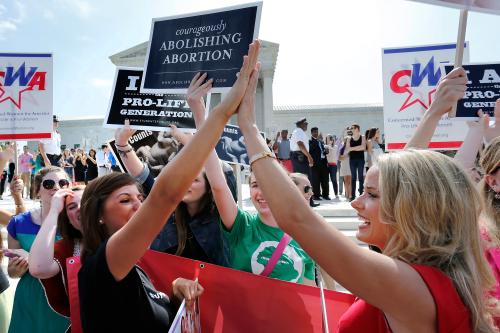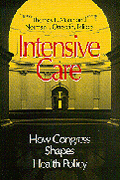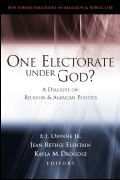On May 4, 2017, President Trump promised to end a longstanding dispute between the Little Sisters of the Poor, an order of Catholic nuns, and the federal government. The dispute was over an accommodation of the nuns’ religious objections to the Affordable Care Act’s (ACA) requirements that most health plans provide cost-free contraception coverage. On October 6, the Trump administration basically ended that dispute—but it also did much more.
Through rules that took effect immediately, the administration announced a new federal policy that differs from previous policy in three key ways. First, the new rules greatly expand the types of employers that are excused from these contraception coverage requirements. Under the previous policy, houses of worship, religiously affiliated nonprofits and closely held businesses did not have to contract, arrange, pay or refer for contraception coverage for their employees. Under the new rules, virtually any nongovernmental employer can exempt themselves from these requirements, including publicly traded corporations asserting religious objections to providing contraception coverage. Second, while the previous policy only recognized religious objections to providing contraception coverage, the new policy states that moral objections are equally valid in many cases. Finally, while the previous policy ensured that almost all women working for objecting employers would get such coverage either from an insurer or third-party administrator (TPA), the government drops any attempt to ensure that this coverage is provided in the new rules. Thus, many women who are receiving contraception coverage under the previous policy may now lose it.
Since 2011, I have called for religious organizations to be exempted from the ACA’s contraception coverage requirements, while also insisting that women working for objecting employers should receive such coverage by other means. These new rules badly miss the mark by allowing even publicly traded corporations to exempt themselves from these requirements, while making no attempt to ensure that female employees of objecting employers receive cost-free contraception coverage, a benefit to which they are entitled under federal law.
The religious exemptions in the new rules may violate the constitutional prohibition on religious accommodations that shift significant costs to people who do not benefit from them (here, female employees of objecting employers). Under these rules, women may effectively be forced by government to pay for the religious exercise of their employers. The U.S. Supreme Court has invalidated religious accommodations when they have failed to strike an appropriate balance. Even in the Burwell v. Hobby Lobby case, where the Court ruled that the government must accommodate the religious beliefs of closely held corporations that object to providing contraception coverage, the Court emphasized that the effect of that accommodation on the corporations’ female employees “would be precisely zero” because these women would receive such coverage from insurers or TPAs instead. The Court warned that its ruling should not be read to say that corporations must be accommodated no matter the impact of the accommodation on thousands of employees.
While the new rules note that there are some governmental programs that provide contraception for low-income women, the administration makes no effort to ensure that these programs would actually provide cost-free contraception to women working for objecting employers, much less in a manner that would not be overly burdensome for these women. Further, some of these programs, such as Medicaid, are on the administration’s chopping block.
The administration takes this approach even though objecting employers have repeatedly insisted that there are many acceptable ways for the state to ensure that women get cost-free coverage from entities other than them. For example, these objectors have noted that the government could “us[e] Title X to make free contraceptives available to any women whose plans do not include them.” The Trump administration could have urged the Republican-controlled Congress to make this happen, but it did not, nor did it make any effort to examine these and other possibilities.
Unfortunately, the new rules may result in an increase in unintended pregnancies and abortions. NBC has reported that a 2012 study found that when women got birth control at no cost to them, the number of unintended pregnancies and abortions dropped by between 62 and 78 percent, and other studies have come to similar conclusions. It is puzzling to see an administration that says it is pro-life downplay concerns like these.
The new rules also have procedural defects. They became effective immediately, rather than allowing for comments to be submitted and considered first. Yes, this matter has a long history, one in which thousands of comments have been filed. But the policy set forth in this rule is almost entirely new.
It would be a welcome development if the lawsuits that are being filed against these new rules—or any Congressional action—result in revisions bringing us closer to a solution that respects religious bodies, women working for objecting employers and Supreme Court precedent. Ultimately, the best resolution would be to adopt a system where health care is not delivered mostly through employers—that way, employers would not have to worry about whether the health care coverage they provide to their employees comports with their faith and values, and workers would not have to worry that the health coverage they need could be vetoed by their bosses.
Until we get there, however, we must seek a better way of protecting rights and interests on all sides. Religious freedom is a fundamental human right that must be defended, and exemptions sometimes must be upheld even when third parties believe they are harmed by those exemptions. For example, synagogues are permitted to hire rabbis, not Baptist preachers, no matter how upstanding those Baptists may be or how much they need a job.
In this case, however, cost-free contraception coverage is a federally mandated benefit for most women under the ACA, and it is possible to accommodate interests on both sides, even if it cannot be done to everyone’s complete satisfaction. Given Supreme Court precedent, seeking such accommodation is the prudent choice. It is also the right course, especially in a country whose future depends partially on our ability to continue to find ways to live together across our deepest differences. The Trump administration did not make that choice, but a win-win solution here should still be our goal.
The Brookings Institution is committed to quality, independence, and impact.
We are supported by a diverse array of funders. In line with our values and policies, each Brookings publication represents the sole views of its author(s).











Commentary
New Trump contraception rules not a win-win solution
October 13, 2017